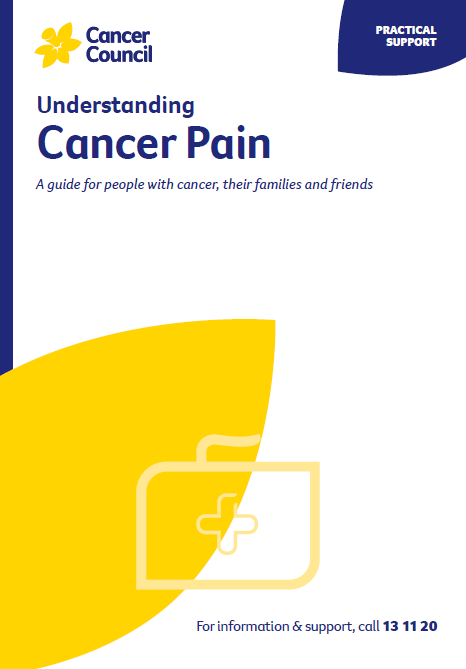Many people with cancer worry that they will be in pain. Not everyone will have pain, and those who do may find the pain comes and goes. Pain is affected by the location of the cancer and its size.
Learn more about:
- Ways to relieve pain
- Using cancer treatments to control pain
- Podcast: Managing Pain when Cancer Is Advanced
Ways to relieve pain
There are several ways to relieve pain. These include:
- pain medicines, such as paracetamol, ibuprofen and other non-steroidal anti-inflammatory drugs, and opioids (e.g. oxycodone, morphine)
- medicines that are normally used for other conditions, such as antidepressants and anticonvulsants (known as adjuvant analgesics)
- procedures to block pain signals (e.g. nerve blocks or spinal injections)
- therapies, such as massage, meditation, relaxation, hypnotherapy, exercise and physical therapy
- psychological therapies that can change the way you think about and respond to pain
- cancer treatments used palliatively.
Often a combination of methods is needed and it may take time to find the right pain relief. If one method doesn’t work, you can try something else. Be sure to tell your doctor and pharmacist of all medicines you take.
For more on this see Pain and cancer.
Using cancer treatments to control pain
Chemotherapy, radiation therapy and surgery are common cancer treatments. They can sometimes be used palliatively to reduce pain by helping to remove its cause.
Radiation therapyThis treatment can be used to relieve many types of pain. The most common form of radiation therapy for pain is external beam radiation therapy. If cancer has spread to many places in the bone and is causing pain, you may have another form of radiation therapy. | |
 | Cancer drug therapiesIn some cases, chemotherapy, hormone therapy, targeted therapies and immunotherapy can shrink a tumour that is pressing on nerves or organs and causing pain. |
SurgerySome people have an operation to remove part or all of a tumour. Surgery can also be used to treat a serious condition such as a bowel blockage (obstruction) that is causing pain, or to reduce the size of a cancer and improve how well chemotherapy and radiation therapy work. | |
Pain management expertsYour GP or oncologist may be able to suggest effective medicine, but if you are still uncomfortable, ask to see a palliative care specialist. Good pain control is one of the major ways a specialist palliative care team can help. How and where the pain is felt, and how it affects your life, may change. Regular check-ups with pain management experts can help keep the pain under control. |
Podcast: Managing Pain when Cancer Is Advanced
Listen to more episodes from our podcast for people affected by advanced cancer
More resources
Prof Chris Karapetis, Network Clinical Director (Cancer Services), Southern Adelaide Local Health Network, Head, Department of Medical Oncology, and Director, Clinical Research in Medical Oncology, Flinders Medical Centre and Flinders University, SA (Clinical review); Dr Amey Aurangabadkar, Radiologist, Illawarra Radiology Group, NSW; Clare Brophy, Consumer; Prof Katherine Clark, Clinical Director of Palliative Care, NSLHD Supportive and Palliative Care Network, Northern Sydney Cancer Centre, Royal North Shore Hospital, NSW; Prof Wendy Cooper, Senior Staff Specialist, Tissue Pathology and Diagnostic Oncology, NSW Health Pathology, Royal Prince Alfred Hospital, NSW; A/Prof Richard Gallagher, Head and Neck Surgeon, Director of Cancer Services and Head and Neck Cancer Services, St Vincent’s Health Network, NSW; Dr Chloe Georgiou, Oncology Research Fellow, Australian Rare Cancer Portal, and Oncology Trials Fellow, Bendigo Health Cancer Centre, VIC; Dr Susan Harden, Radiation Oncologist, Peter MacCallum Cancer Centre, VIC; Justin Hargreaves, Medical Oncology Nurse Practitioner, Bendigo Health Cancer Centre, VIC; Dr Laura Kirsten, Principal Clinical Psychologist, Nepean Cancer Care Centre, NSW; Prof Linda Mileshkin, Medical Oncologist, Peter MacCallum Cancer Centre, VIC; Caitriona Nienaber, 13 11 20 Consultant, Cancer Council WA.
View the Cancer Council NSW editorial policy.
View all publications or call 13 11 20 for free printed copies.

